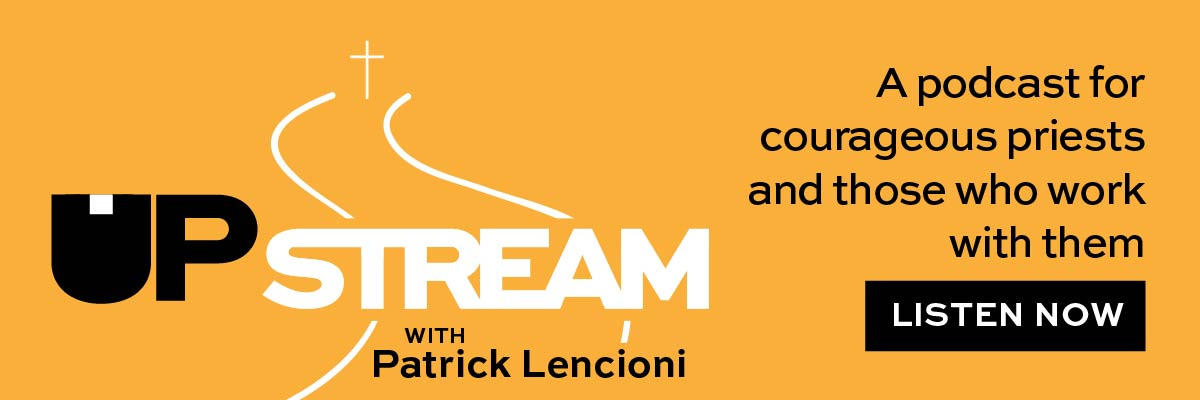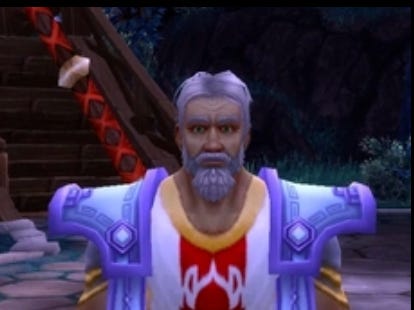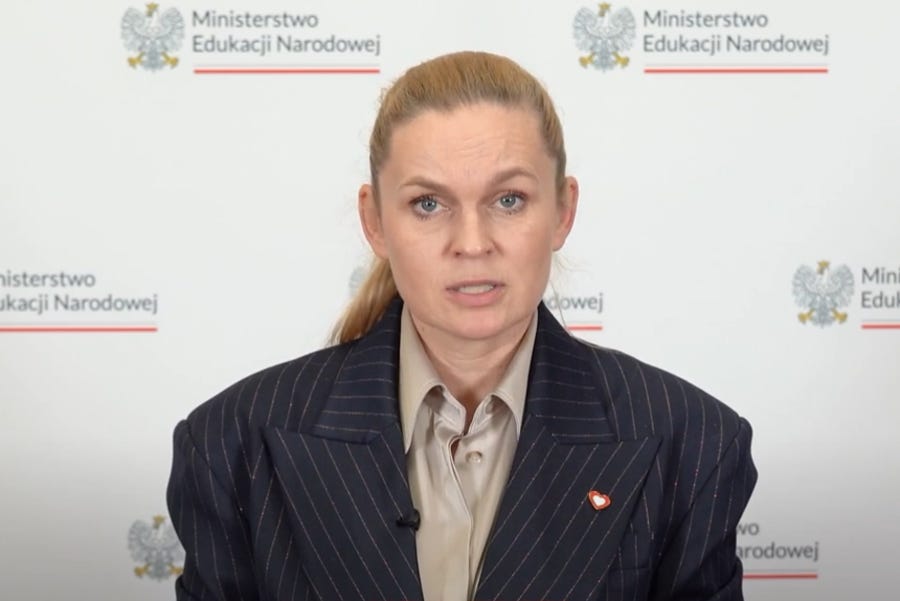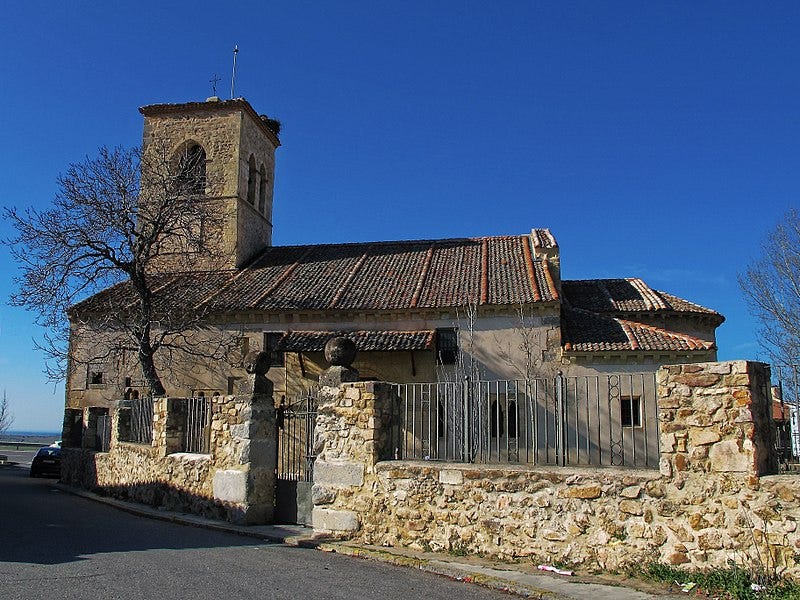Pillar subscribers can listen to this Pillar Post here: The Pillar TL;DR
Hey everybody,
Today’s the feast of the missionary abbot William of Vercelli, you’re reading The Tuesday Pillar Post, and I do not have Covid.
I thought I had Covid, because I’ve been feeling unwell over the past few days, and Sunday School’s Dr. Scott Powell suggested it was Covid, and I make it a point to believe him whenever possible.
But an uncomfortable nostril test this morning told me that Dr. Powell did not get it right, and I probably just have an annoyingly uncomfortable cough and cold — indeed, when I awoke feeling ill on Saturday, I thought it was because I’d tippled just a bit too much port on Friday night, but it has unfortunately persisted, or gotten worse, since then.
Now, I tell you that not because I think you’re especially interested in my health. You’re not.
Rather, I’m mentioning it because I’m offering up the little suffering of discomfort for something I’d like to invite you to join me in praying about.
For Muslims, last week was the annual commemoration of Hajj, the time at which those who can afford it, and are well enough to travel, are called to make a usually once-in-a-lifetime pilgrimage to Mecca, Saudi Arabia, so that they can perform a number of religiously significant rituals, including a seven-times walk around the Kaaba, a large black building at the center of a mosque, which is regarded as the holiest site in Islam, and the spot which Muslims around the world aim to face as they pray each day.
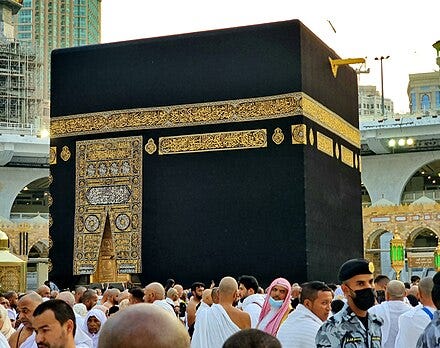
By definition, the Hajj involves a lot of walking. There is the walking-around-the-Kaaba part, but there is also a seven times walk between two hills, which adds up to a couple of miles, and there is sometimes a lot of ordinary walking to get to the places where the ritual walking takes place.
This year, it was 120 or 125 degrees in Saudi Arabia when millions of pilgrims showed up for their pilgrimage, and some of them — especially among the hundreds of thousands of unregistered pilgrims using shady and unreliable guides and tour operators — had to stay in places without air conditioning, or walk for miles and miles, sometimes without water, to get to their holy places.
At least 1,300 people died during this year’s Hajj pilgrimage — and that death count is expected to rise considerably in the next week or so. So my invitation is this: Let’s pray for the souls of those who died while aiming to follow the call of their own faith. Let’s pray also for those who are exploited or taken advantage of by the dishonest and disreputable travel brokers who sell lies to Muslims from poor countries, and then put them in unsafe situations in Saudi Arabia.
And, considering that most of those who died — and the half million people treated for heat-related conditions during the Hajj— weren’t drinking enough water, let’s also remember the two billion people around the world who live without easy access to safe drinking water.
In the summer heat, while we’re lugging our ubiquitous Stanleys, Hydro Flasks, or Nalgenes to the pool, and watering our lawns with potable water, parents in other parts of the world are wondering how to get clean enough water for their children that it won’t make them sick.
The least we can do is to pray for them.
The news
Ruffini said that since Rupnik is still on trial at the Vatican, his department should wait before discontinuing use of the art, suggesting that to stop using his artwork in official Vatican publications and websites would be to unfairly “judge” him.
Further, Ruffini insisted that — despite disagreement from the reporters in the room — that removing the artwork from the Vatican website, despite calls from abuse victims to do exactly that, is “not the way to be close to the victims.”
Paulina Guzik of OSV News followed up on Ruffini’s remarks, countering that she believed removing Rupnik’s artwork would demonstrate a greater closeness to victims.
Ruffini retorted, “You think so? Well, I think you’re wrong. I think you are wrong. I really think you are wrong,” he told her.
And Ruffini seemed to downplay the horror of the abuse itself, insisting that “we’re not talking about the abuse of minors” — seeming to suggest that the coercive, exploitative, violent, and sacrilegious abuse of women might rate a less troublesome crime for some sectors of the Roman Curia.
And it seems to me to need very little further analysis from me: Ruffini’s remarks seem entirely consistent with the way the Vatican has behaved about Rupnik since the scandal first emerged over the artist-priest two years ago. Ruffini is not likely to face any kind of consequences, despite continued objections from American journalists, from victims and victims advocacy groups — and probably from bishops and some curial officials.
Ruffini’s remarks evince none of the kind of deepened understanding of abuse and its consequences that many American Catholics have gained since 2018, when the voices of victims began to be listened to, at least in some corners, and heard more often. We have a long way to go — all of us — and Ruffini’s remarks have reminded many Catholics of just that.
But allow me to note one particular irony. A Vatican press briefing reported this morning on a meeting of the Ordinary Council of the General Secretariat of the Synod, which organizes the synod on synodality. The meeting took place in the days immediately after Ruffini’s remarks.
The work of the meeting, according to today’s briefing was to emphasize the “grassroots” nature of the synod on synodality, and, indeed, the synod’s call to place listening at the center of the Church’s life.
In the briefing without an apparent sense of self-awareness regarding the Ruffini stuff, Cardinal Mario Grech noted the “accountability that characterizes a synodal Church,” which apparently comes in a “synodal Church” through serious and attentive listening to the views, perceptions, and discernment of Catholics.
On Rupnik, that accountability is still apparently in the development phase, as the Dicastery for Communications learns what it will mean to undergo the “pastoral conversion,” as Grech called it, of synodality.
But last week, five Syro-Malabar bishops said they couldn’t support a precept that warned priests they’d be excommunicated if they couldn’t accept the Church’s prescribed liturgical rubrics by July 3.
The bishops said the ultimatum was draconian, and that it was issued without sufficient consultation of the Syro-Malabar episcopate.
Remember, you only read intelligent, sober, serious ongoing coverage of this story at The Pillar. We cover it because it matters, even if it's not in your backyard.
And if you think our coverage of the Church across the globe is important, subscribe, to keep us going:
—
As we, and everyone else on the planet, reported last week, Archbishop Carlo Maria Viganò is facing allegations of schism — for rejecting the validity of the Francis papacy — and a penal process at the Vatican’s Dicastery for the Doctrine of the Faith.
But the kind of process Viganò is facing has raised a lot of questions in some corners, because rather than a full trial, Viganò’s case will be heard in an “extrajudicial process,” sometimes called an “administrative penal process.”
So what’s that? How does it work? Why isn’t Viganò having a full trial?
Upstream, a new podcast from Patrick Lencioni, provides ideas and encouragement so courageous priests can more effectively run their parishes and spread the Gospel. Pat is not only a passionate Catholic but is the pioneer of the organizational health movement and one of the world’s foremost experts on leadership and teamwork.
And in an analysis this week, Edgar Beltrán suggests that the choices for Argentina’s news auxiliaries might convey a lot about what will happen in a country with a recently troubled episcopal landscape.
What’s the deal with that? Find out here.
—
When U.S. Catholic bishops met in Louisville, Kentucky this month, they talked in a closed-door session about the future of the Catholic Campaign for Human Development, a USCCB anti-poverty initiative focused on giving grants to community organizing organizations.
Paprocki proposes launching an “National Campaign for Catholic Education,” an annual second collection meant to support Catholic schools, and other models of Catholic education, in communities across the country. And he suggests that Catholic education is the best thing the Church can offer to help people break “the cycle of poverty.”
In a lengthy interview with The Pillar, Paprocki explained:
“The question is: How do you help people rise out of poverty?
“I think the Catholic Church has the greatest track record in that regard through our Catholic schools — that the best way to break the cycle of poverty, to see someone rise out of poverty, is having a good education through which they can have gainful employment.
“So that leads to me questioning the effectiveness of primarily funding community organizers. I am asking what we can fund that has been shown to be effective in terms of raising people out of poverty. And I believe that would be Catholic education.”
Of course, the USCCB is a pretty big machine, and getting it to change course isn’t easy. But Paprocki said that leadership means floating big ideas:
“You take a risk sometimes in being a leader, that you propose ideas and you hope other people will follow and get on board with them. But if not, then you say, ‘Well, okay, people aren't interested, they don't want to follow, I guess then we just let it go.’
“But I think you have to make things happen sometimes. You have to take the risk and put an idea out there, and see if anybody else is interested in going along with it.”
Whether the idea will get off the ground, it’s a proposal meant to start a conversation.
Read a fascinating interview here.
Their own thing
For the first time in their 31-year franchise history, the NHL’s Florida Panthers are the Stanley Cup Champions.
Their Game 7 win Monday night came after one of the most exciting Cup Finals series in a long time.
The Panthers took a 3-0 series lead, then, shockingly, lost three games to the Edmonton Oilers, who staved off elimination with three huge games of their own.
Edmonton — and indeed, the entire nation of Canada — had all the momentum going into Game 7.
But the Panthers kept a high-scoring offense in check, and won the Cup — the most coveted trophy in sports.
I watched Game 7. But I didn’t get to watch very many of the previous games, or much of the playoffs at all. Or even as much of the regular season as I would have liked.
Readers of The Pillar know that I love hockey. I’ve been following the game since I was 7 or 8, and playing, off and on, for nearly that long. But I haven’t really been able to pass on the hockey bug to any of my children.
And lately, much of my sport time is consumed by a sport I am learning to love. Working to love. Willing to love.
Baseball.
See, since late February, I’ve had children playing baseball — in a middle school league, in Special Olympics, in a summer little league. I’ve done a fair bit of dugout time, coaching time, and catch time. In fact, I realized today that since late February, I’ve probably put my mitt on just about every single day, except for those when I’m out of town working.
And, I mean, I like baseball as much as the next guy. I like going to games, I like playing catch, I like baseball video games. We went to a Rockies game on Sunday, at the generous invitation of friend and Pillar reader (in a very good way) Trevor Williams, and it was a really awesome time.

But my kids don’t just like it. They love being on baseball teams. Max played first, loving the team part, but not so much the catching and running.
Pia and Davey, wanting to be like their big brother, signed up for teams soon after. They loved the game itself. They want to practice with me every single day. Davey is already talking about something called “fall ball.” Where he learned about that, I do not know, but it sounds expensive.
The thing is, baseball is their thing. I’m invited into it — I can tell Davey to keep his arm up when he loads the bat and open his hips to swing, or I can coach Pia to squeeze her glove when she grabs a fly ball.
But it’s really their thing, not mine.
As a dad, I find that pretty cool. It’s neat to discover that my children have some love that Kate and I did not pass on to them — something they find joy in on their own terms, not mine.
My kids are young, but seeing them discover something they love has reminded me of the Christian vocations they’ll discover.
Max and Pia, who both have Down syndrome, almost certainly have the vocation of friendship — of witnessing to the efficacy of baptism in the way they love the people they know, and even the people they don’t. But it remains to be seen how that will play out over their lifetimes.
And Daniel, who was until baseball my carbon copy, has an as-yet-unknown lifetime vocation, some beautiful way in which God will call him, which will be his thing, not mine.
Watching them on the ball field, I’ve thought how much God the Father loves watching us live our vocations. And I’ve been reminded that serving the Lord, with whatever hardships come with it, is meant especially to bring us joy, to give us the sense of being most fully alive, and most fully ourselves.
I hope that I’ll help my children discover the ways in which God calls them to live joyfully for the Kingdom. I hope that I’ll support them in whatever it is the Lord wants them to do for his glory, and their joy.
Unless it’s this:
If, by chance, they decide that hobby horsing — properly called stick horse quadrille — is their life’s vocation, we’re gonna have some problems. Here I stand, I can do no other.
—
Thank you to those of you who have become paying subscribers to The Pillar in recent weeks. We’re so grateful to you — you keep The Pillar in business, and support of public accountability in the life of the Church.
And if you meant to subscribe, but forgot, now’s your chance.
Please be assured of our prayers. And please pray for us. We need it.
Yours in Christ,
JD Flynn
editor-in-chief
The Pillar

